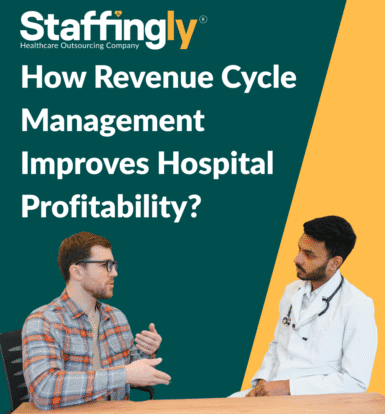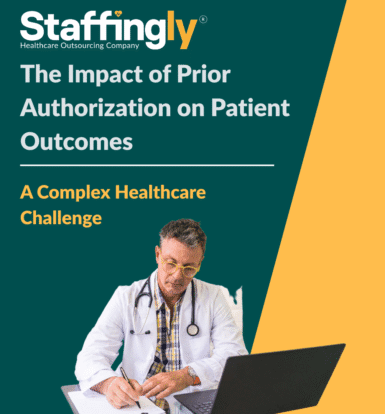On-Demand Outsourcing BPO Services for Healthcare Providers With 24/7 Coverage!
Save up to 70% on staffing costs!
Browse Specialty Staffing Services
The Role of Coding and Billing in Healthcare Revenue Cycle Management
Healthcare revenue cycle management (RCM) is a critical process that ensures healthcare organizations are paid for the services they provide. This comprehensive system encompasses the entire lifecycle of a patient’s encounter with the healthcare system from the initial appointment to the final payment. Central to RCM are two key components: coding and billing. These functions are fundamental in ensuring that healthcare providers receive accurate and timely reimbursement from insurers and patients. Let’s explore the roles of coding and billing in

Benefits of Outsourcing Healthcare Revenue Cycle Management
In the fast-paced, high stakes world of healthcare, keeping a practice financially healthy is just as critical as delivering quality care. That’s where Revenue Cycle Management (RCM) steps in a vital process that governs how medical organizations track, collect, and optimize revenue from patient services. But as regulations tighten and administrative demands soar, more and more healthcare providers are turning to a smarter solution: outsourcing RCM to specialized experts. This isn’t just about cutting costs it’s about unlocking efficiency, boosting

How Revenue Cycle Management Improves Hospital Profitability?
Revenue Cycle Management (RCM) is one of the most critical functions in modern healthcare systems. It encompasses every administrative and clinical function involved in capturing, managing, and collecting patient service revenue. When implemented efficiently, RCM can dramatically enhance hospital profitability by minimizing revenue leakage, improving operational efficiency, and maximizing reimbursement. Understanding Revenue Cycle Management Revenue Cycle Management begins the moment a patient schedules an appointment and ends when the healthcare provider receives full payment for services rendered. The key stages

Reducing Claim Denials Through Prior Authorization Outsourcing
In the ever-evolving world of healthcare, claim denials remain a major issue for providers and insurers alike. With rising administrative burdens, increasing patient volumes, and complex insurance regulations, healthcare organizations often struggle to maintain efficient billing processes. One of the key contributors to these challenges is the prior authorization process. However, a growing trend is emerging: healthcare providers are turning to prior authorization outsourcing as a way to reduce claim denials, improve efficiency, and streamline the overall process. What is

Revenue Cycle Management for Large Healthcare Organizations: Optimizing Financial Performance and Patient Experience
In the ever evolving landscape of healthcare, large healthcare organizations face unique challenges in managing their revenue cycles effectively. Revenue Cycle Management (RCM) encompasses the entire financial process from the point of patient registration to the final payment for services rendered. The importance of RCM cannot be overstated, as it directly impacts the financial health of a healthcare organization, ensuring that providers are compensated for the care they deliver while maintaining regulatory compliance. Effective RCM also improves the patient experience

The Impact of Prior Authorization on Patient Outcomes: A Complex Healthcare Challenge
In the ever-evolving landscape of healthcare, prior authorization (PA) has become an essential process for determining whether a patient’s treatment will be covered by insurance. However, while intended to control costs and ensure appropriate care, prior authorization can have profound implications for patient outcomes. This article explores the challenges and consequences of PA on patient care and how it affects clinical decisions, treatment timeliness, and overall health outcomes. What is Prior Authorization? Prior authorization is a practice employed by health

Optimizing Revenue Cycle Management for Dental Practice Success
In today’s competitive healthcare landscape, dental practices must prioritize efficient Revenue Cycle Management (RCM) to maintain financial stability and foster growth. RCM is the process of managing the financial flow from the initial patient appointment to the final payment, ensuring timely and accurate reimbursement for services rendered. An optimized revenue cycle not only boosts cash flow but also enhances patient satisfaction by minimizing billing errors and confusion. What is Revenue Cycle Management? Revenue Cycle Management refers to the administrative and

Common Reasons Prior Authorization Gets Denied in Healthcare
Prior authorization (PA) serves as a checkpoint in healthcare to ensure that services, procedures, and medications meet an insurance plan’s coverage and necessity standards. However, prior authorization denials remain a persistent challenge, delaying patient care and creating administrative burdens. Understanding the common reasons behind these denials is essential for healthcare providers and patients alike. Incomplete or Missing Information Insurance companies require comprehensive documentation to review a prior authorization request. Missing medical records, inadequate physician notes, lack of relevant lab results,
 Book a Demo to Build Your Team Today!
Book a Demo to Build Your Team Today!


 Read Case Studies
Read Case Studies 



 Virtual Medical Assistants
Virtual Medical Assistants



